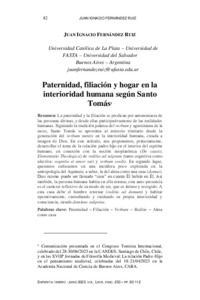Por favor, use este identificador para citar o enlazar este ítem:
https://repositorio.uca.edu.ar/handle/123456789/19810| Campo DC | Valor | Lengua/Idioma |
|---|---|---|
| dc.contributor.author | Fernández Ruiz, Juan Ignacio | es |
| dc.date.accessioned | 2025-05-21T20:15:32Z | - |
| dc.date.available | 2025-05-21T20:15:32Z | - |
| dc.date.issued | 2023 | - |
| dc.identifier.issn | 0036-4703 | - |
| dc.identifier.uri | https://repositorio.uca.edu.ar/handle/123456789/19810 | - |
| dc.description.abstract | La paternidad y la filiación se predican por antonomasia de las personas divinas, y desde ellas participativamente de las realidades humanas. Siguiendo la tradición joánica del verbum y agustiniana de la mens, Santo Tomás se aproxima al misterio trinitario desde la generación del verbum mentis en la interioridad humana, creada a imagen de Dios. En este artículo, nos proponemos, primeramente, desarrollar el tema de la relación padre-hijo en el interior del espíritu humano, en conexión con la noción neoplatónica (De causis; Elementatio Theologica) de reditio ad seipsum (tanto cognitiva como afectiva: cognitio et amor sui) y verbum cordis. En segundo lugar, queremos enfocarnos en una metáfora poco explorada en la antropología del Aquinate, a saber, la del alma como una casa (domus). Dios mismo puede ser llamado “casa” en cuanto Él habita en Él. Así también, la persona humana habita en ella misma; esta auto-presencia es el carácter reflexivo de su modo de ser, que es íntimo y recogido. A esta casa debe el hombre retornar (reditio ad domum) y habitar operativamente, custodiando y cuidando su propia interioridad y consciencia, siendo dominus suiipsius. | es |
| dc.description.abstract | Paternity and filiation are predicated by essence of the divine persons, and from them of human realities by participation. Following the Johannine tradition of the verbumand the Augustinian tradition of the mens, Aquinas approaches the Trinitarian mystery from the generation of the verbum mentisin human interiority, created in the image of God. In this article, we propose, first, to develop the theme of the father-son relationship within the human spirit, in connection with the Neoplatonic notion (De causis; Elementatio Theologica) of reditio ad seipsum(both cognitive and affective: cognitio et amor sui) and verbum cordis. Secondly, we want to focus on a metaphor not often explored in Aquinas's anthropology, namely that of the soul as a house (domus). God Himself can be called a "house" insofar as He dwells in Himself. So too, the human person dwells in himself; this self-presence is the reflective character of his mode of being, which is intimate and recollected. To this house man must return (reditio ad domum) and dwell operatively, guarding and caring for his own interiority and consciousness, being dominus suiipsius. | es |
| dc.format | application/pdf | es |
| dc.language.iso | spa | es |
| dc.publisher | Pontificia Universidad Católica Argentina. Facultad de Filosofía y Letras | es |
| dc.rights | Atribución-NoComercial-CompartirIgual 4.0 Internacional | * |
| dc.rights.uri | http://creativecommons.org/licenses/by-nc-sa/4.0/ | * |
| dc.source | Sapientia. Vol.79, No.253, 2023 | es |
| dc.subject | PATERNIDAD | es |
| dc.subject | FILIACION | es |
| dc.subject | REDITIO | es |
| dc.title | Paternidad, filiación y hogar en la interioridad humana según Santo Tomás | es |
| dc.title | Paternity, filiation and home in human interiority according to Aquinas | es |
| dc.type | Artículo | es |
| uca.disciplina | FILOSOFIA | es |
| uca.issnrd | 1 | es |
| uca.affiliation | Fil: Fernández Ruíz, Juan Ignacio, Universidad Católica de La Plata; Argentina | es |
| uca.affiliation | Fil: Fernández Ruíz, Juan Ignacio, Universidad de FASTA; Argentina | es |
| uca.affiliation | Fil: Fernández Ruíz, Juan Ignacio, Universidad del Salvador; Argentina | es |
| uca.version | publishedVersion | es |
| item.fulltext | With Fulltext | - |
| item.languageiso639-1 | es | - |
| item.grantfulltext | open | - |
| Aparece en las colecciones: | SAP - 2023 Vol LXXIX nro. 253 | |
Ficheros en este ítem:
| Fichero | Descripción | Tamaño | Formato | |
|---|---|---|---|---|
| Fernández+Paternidad+filiación+y+hogar.pdf | 385,45 kB | Adobe PDF |  Visualizar/Abrir |
Este ítem está sujeto a una Licencia Creative Commons

